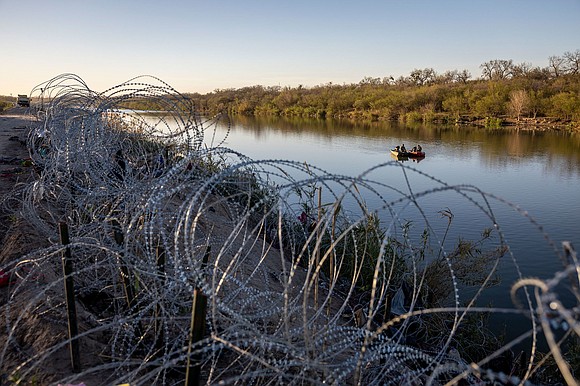Texas tells Supreme Court it’s working to give Border Patrol access to boat ramp on Rio Grande
1/13/2024, 12:14 p.m.

Originally Published: 12 JAN 24 09:13 ET
Updated: 13 JAN 24 12:56 ET
By Devan Cole, CNN
(CNN) — Texas officials told the Supreme Court early Saturday that the state is “working promptly” to ensure US Border Patrol agents have access to a boat ramp used to launch patrol boats into the Rio Grande, a day after the Biden administration complained to the court that the state had effectively blocked agents’ access to a key part of the US-Mexico border.
“The Solicitor General’s late-night supplemental response was the first time that Texas learned of Defendants’ claim that its remaining law-enforcement activities in the area depended on access to the municipal boat ramp located at Shelby Park,” attorneys for the state wrote in a court filing submitted just before 2 am ET Saturday.
“Nevertheless, Texas is currently working to ensure that Border Patrol has access to the boat ramp for the reasons cited by the Solicitor General in her brief — namely, surveillance, patrol, and humanitarian rescue,” the attorneys wrote.
Shelby Park is located in Eagle Pass, Texas, an area that has seen a high number of migrants cross into the state.
The Biden administration told the Supreme Court on Friday that Texas is effectively blocking the agents from accessing a portion of the US-Mexico border, stressing that new barriers recently erected by the state “reinforce” the federal government’s need for the high court to quickly intervene in the matter.
The dispute before the Supreme Court concerns Border Patrol agents’ practice of removing razor wire put in place by Texas along part of the border. The state sued the federal government over the practice, and a lower court ordered the agents to stop removing the wire while legal challenges play out.
“Texas’s new actions since the government’s filing demonstrate an escalation of the State’s measures to block Border Patrol’s ability to patrol or even to surveil the border and be in a position to respond to emergencies,” Solicitor General Elizabeth Prelogar wrote in court papers.
“Those actions have also changed the situation on the ground from the account in prior filings in this Court, including Texas’s opposition,” she added. “Those developments reinforce the need for this Court to vacate the court of appeals’ injunction, and to do so as soon as possible.”
Prelogar’s filing underscored how necessary the federal government sees the Supreme Court’s potential intervention in the matter and highlights tensions between the federal government and Texas over border enforcement. The Justice Department asked the court on January 2 to step in on an emergency basis to put on hold the lower-court order that prevented Border Patrol agents from removing concertina wire put in place by Texas.
The filing said the new barriers erected by Texas this week included not only more concertina wire along a part of the Rio Grande River, but also “new fencing, located further inland than the original concertina wire,” gates and military Humvees, among other things. Photographs of the new barriers were included in the filing.
“Because Border Patrol can no longer access or view this stretch of the border, Texas has effectively prevented Border Patrol from monitoring the border to determine whether a migrant requires the emergency aid that the court of appeals expressly excepted from the injunction,” Prelogar wrote in the filing.
The-CNN-Wire









